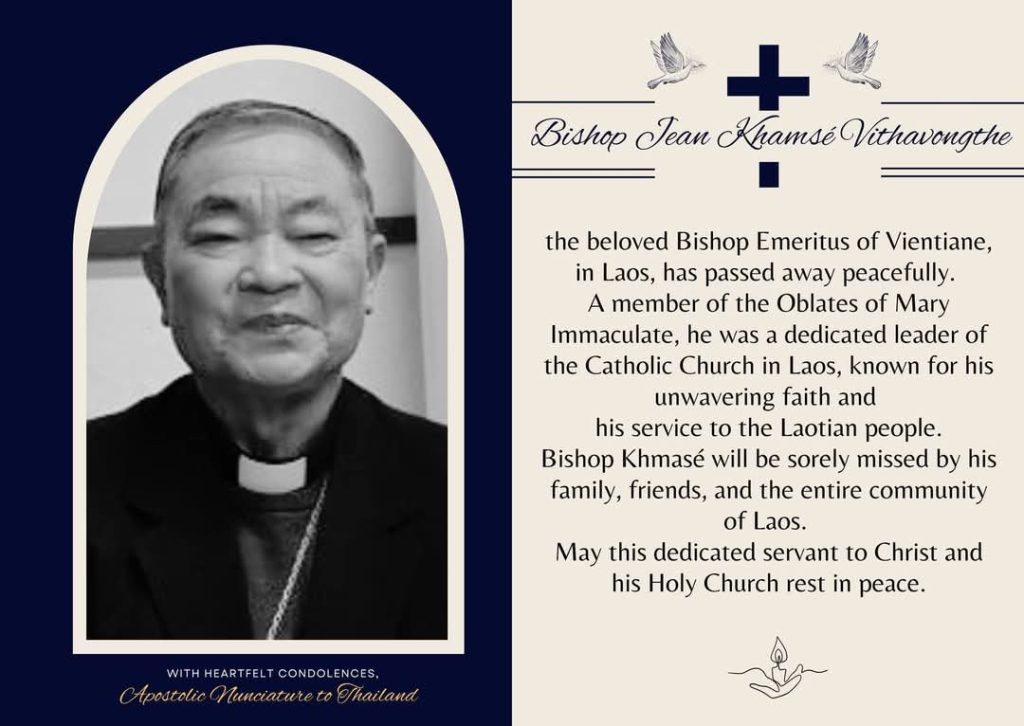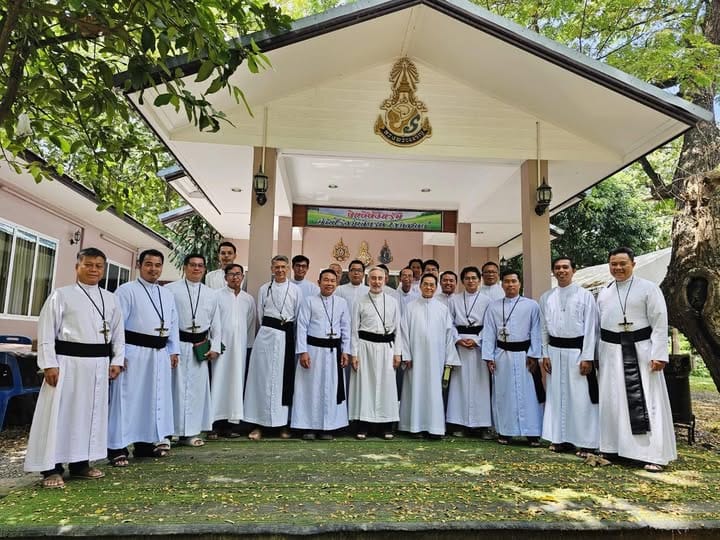Bishop Jean Khamsé Vithavongthe, a dedicated missionary and Vicar Apostolic Emeritus of Vientiane in Laos, passed away on Dec. 8 at 82.
A member of the Missionary Oblates of Mary Immaculate (OMI), Bishop Khamsé devoted his life to pastoral ministry despite numerous challenges, including years under a restrictive regime in Laos.
“He had many diseases, especially diabetes and high blood pressure. In the last few years, he had to be bedridden, making communication difficult,” said Fr. Peter Preecha Thamniyom, a former superior of OMI Thailand.
“He was my close friend, a devout, intelligent person who loved music. Before he became a bishop, we often shared thoughts, and he trusted and respected me deeply. I was honored to assist him in many ways,” the priest added.
A message released by the Apostolic Nunciature in Thailand reads, “[Bishop Khamsé] was a dedicated leader of the Catholic Church in Laos, known for his unwavering faith and his service to the Laotian people. Bishop Khamsé will be sorely missed by his family, friends, and the entire community of Laos.”

As a shepherd, Bishop Khamsé demonstrated a strong determination to remain with his flock, once saying, “I don’t want to leave the country despite so many challenges.”
Bishop Khamsé faced significant health challenges, including three strokes approximately seven years ago, which left him frail and ultimately led to his early resignation at the age of 74.
His tenure was marked by pastoral dedication despite the immense difficulties of ministering in regions of northern Laos, such as Luang Prabang and Xam Neua, where Christian presence was severely restricted.
“I first met Bishop Khamsé at an FABC meeting almost 20 years ago and since then we have been collaborating to support formation of youth and lay pastoral workers,” recounted Charles Bertille, consultant for Porticus Asia and former director of the Institute of Formation Fondacio Asia (IFFAsia). He was moved to go and meet Msgr Khamsé after reading about the situation of the Church there.
“He came from a generation of bishops who had gone through tremendous challenges and pastorally this meant he was always solicitous about the welfare of his community,” Charles added. “He was always gracious and welcoming, and most impressively could switch with ease between a few languages! He leaves a legacy of resilience and formation, especially with the young IFFAsia alumni who have gone on to faithfully serve their Church and local communities and even in international NGOs.”
Early life and formation
Born on Oct. 18, 1942, in Kengsadok, the oldest Christian village in northern Laos, Bishop Khamsé began his journey of faith and education at the Collège de Mazenod in Paksane.
In 1959, he traveled to France for his juniorate studies and later entered the novitiate at La Brosse-Montceaux in 1963. He professed his first vows in 1964 and pursued philosophical studies in Solignac.
After returning briefly to Laos for a pastoral internship, he continued his theological studies at the Ateneo de Manila in the Philippines. He made his perpetual profession in 1971 and was ordained a priest on January 25, 1975, in his hometown.
His ordination coincided with a turbulent time in Laos, as communist authorities consolidated control, creating significant barriers to church ministry.
The OMI has been in Laos for over 50 years, enduring hardships to sustain its pastoral mission.

Episcopal ministry in adversity
In 1982, Pope John Paul II appointed Jean Khamsé as Coadjutor Vicar Apostolic of Vientiane and titular bishop of Moglaena. His episcopal ordination on January 16, 1983, was marked by secrecy due to political sensitivities.
At the age of 41, he became a bishop, succeeding Bishop Thomas Nantha in 1984.
As Vicar Apostolic of Vientiane and Apostolic Administrator of Louang Prabang until 1999, Bishop Khamsé faced isolation and constant surveillance.
Many clergy, including his colleagues, were imprisoned. Despite these hardships, his ministry bore fruit, particularly during the late 1990s, when Laos began to open up internationally.
The arrival of foreign missionaries and religious sisters provided much-needed support to the church.
Legacy and final years
Bishop Khamsé played a pivotal role in preparing the Catholic community in Laos for significant milestones, including the beatification of 15 martyrs in Vientiane in 2016.
This event marked the culmination of his lifelong commitment to faith, even under persecution.
After stepping down in 2016 due to health concerns, Bishop Khamsé lived a quiet, prayerful life. His passing marks the end of an era for the Church in Laos, but his legacy of resilience and devotion continues to inspire.
Funeral arrangements and tributes are yet to be announced by the OMI community.







